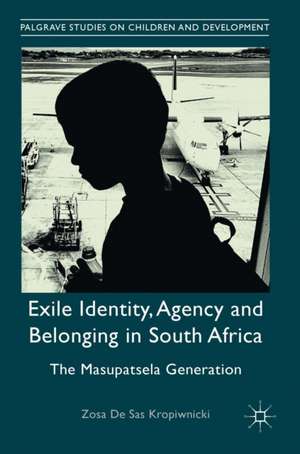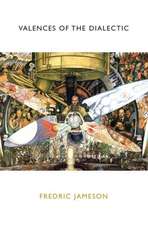Exile Identity, Agency and Belonging in South Africa: The Masupatsela Generation: Palgrave Studies on Children and Development
Autor Zosa De Sas Kropiwnickien Limba Engleză Hardback – 24 iul 2017
This book examines the experiences of 49 second-generation exiles from South Africa. Using “generation” as an analytical concept, it investigates the relational, temporal and embodied nature of their childhoods in terms of kinship relations, life cycle, cohort development and memory-making. It reveals how child agents exploited the liminal nature of exile to negotiate their sense of identity, home and belonging, while also struggling over their position and power in formal Politics and informal politics of the everyday. It also reflects upon their political consciousness, identity and sense of civic duty on return to post-apartheid South Africa, and how this has led to the emergence of the Masupatsela generational cohort concerned with driving social and political change in South Africa.
| Toate formatele și edițiile | Preț | Express |
|---|---|---|
| Paperback (1) | 697.65 lei 6-8 săpt. | |
| Springer International Publishing – 13 mai 2018 | 697.65 lei 6-8 săpt. | |
| Hardback (1) | 703.06 lei 6-8 săpt. | |
| Springer International Publishing – 24 iul 2017 | 703.06 lei 6-8 săpt. |
Preț: 703.06 lei
Preț vechi: 827.13 lei
-15% Nou
Puncte Express: 1055
Preț estimativ în valută:
134.57€ • 146.23$ • 113.11£
134.57€ • 146.23$ • 113.11£
Carte tipărită la comandă
Livrare economică 21 aprilie-05 mai
Preluare comenzi: 021 569.72.76
Specificații
ISBN-13: 9783319532752
ISBN-10: 3319532758
Pagini: 230
Ilustrații: XVII, 350 p.
Dimensiuni: 148 x 210 x 27 mm
Greutate: 0.59 kg
Ediția:1st ed. 2017
Editura: Springer International Publishing
Colecția Palgrave Macmillan
Seria Palgrave Studies on Children and Development
Locul publicării:Cham, Switzerland
ISBN-10: 3319532758
Pagini: 230
Ilustrații: XVII, 350 p.
Dimensiuni: 148 x 210 x 27 mm
Greutate: 0.59 kg
Ediția:1st ed. 2017
Editura: Springer International Publishing
Colecția Palgrave Macmillan
Seria Palgrave Studies on Children and Development
Locul publicării:Cham, Switzerland
Cuprins
Chapter 1: Introduction.- Act I: Exile.- Chapter 2: Roots and routes of exile.- Chapter 3: The emergence of a generational cohort- Chapter 4: Care and protection in the liminal spaces of exile.- Chapter 5: Home, identity and belonging.- Act II: Return.- Chapter 6: Introduction.- Chapter 7: The meeting of myths and reality.- Chapter 8: Identity and belonging in post-apartheid South Africa.- Chapter 9: Obligations and agency in post-apartheid South Africa.- Chapter 10: Conclusion.
Notă biografică
Zosa De Sas Kropiwnicki is a Senior Research Associate in the Department of Anthropology and Development Studies at the University of Johannesburg, South Africa.
Textul de pe ultima copertă
This book examines the experiences of 49 second-generation exiles from South Africa. Using “generation” as an analytical concept, it investigates the relational, temporal and embodied nature of their childhoods in terms of kinship relations, life cycle, cohort development and memory-making. It reveals how child agents exploited the liminal nature of exile to negotiate their sense of identity, home and belonging, while also struggling over their position and power in formal Politics and informal politics of the everyday. It also reflects upon their political consciousness, identity and sense of civic duty on return to post-apartheid South Africa, and how this has led to the emergence of the Masupatsela generational cohort concerned with driving social and political change in South Africa.
Caracteristici
Is highly interdisciplinary, drawing on Anthropology, Sociology, Development Studies, Historical Studies, Political Science, Gender Studies and Childhood Studies Adds value to the ongoing debate about 'liberation' and what it means to be 'South African' Makes a theoretical contribution to issues related to life course, childhood, gender and migration Will aid development practitioners seeking to protect and assist children confronted by violence and forced migration Challenges preconceived notions of victimhood, risk, resilience and trauma




















